|
|
|
Sort Order |
|
|
|
Items / Page
|
|
|
|
|
|
|
| Srl | Item |
| 1 |
ID:
068150
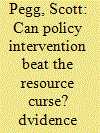

|
|
|
| 2 |
ID:
072302
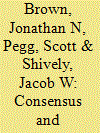

|
|
|
|
|
| Publication |
2006.
|
| Summary/Abstract |
There is a growing debate over the extent of consensus or divergence found within interdisciplinary International Studies (IS) programs. Unfortunately, with a few exceptions, this debate has taken place in the absence of empirical data. This article advances our understanding of the current state of IS curricula through an analysis of data generated from a survey of 140 interdisciplinary undergraduate IS majors across the United States. The surveyed programs comprise 63 Doctoral/Research institutions, 40 Master's institutions, and 37 Baccalaureate institutions found in 38 states and the District of Columbia. The 140 programs are analyzed in terms of six basic components: introductory course(s), research methods, capstone course(s), area and/or thematic concentrations, study abroad, and foreign language requirements. The findings demonstrate significant areas of both consensus and divergence in IS programs.
|
|
|
|
|
|
|
|
|
|
|
|
|
|
|
|
| 3 |
ID:
147377
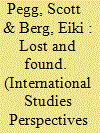

|
|
|
|
|
| Summary/Abstract |
De facto states are typically seen as marginal actors in the international system. Although they control territory and provide governance, their claims to sovereignty remain largely unrecognized. It is widely believed that such entities are either ignored or viewed with hostility by the vast majority of sovereign states. Rather than theoretically presume such relations, we empirically investigate de facto state–great power interactions through the use of a novel data set comprising 448 “WikiLeaks” US diplomatic cables from 2003 to 2010. Specifically, we examine US relations with the four de facto states of Abkhazia, Nagorno-Karabakh, Somaliland, and Northern Cyprus to test four different hypotheses designed to explain what determines the degree of US support or hostility toward individual de facto states. We find that hostility/support and isolation/engagement often go hand in hand, yet vary significantly across our selected cases. De facto states are not treated as homogenous entities and US foreign policy is quite capable of discriminating between them and calibrating its interactions with them.
|
|
|
|
|
|
|
|
|
|
|
|
|
|
|
|
| 4 |
ID:
162480
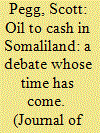

|
|
|
|
|
| Summary/Abstract |
Somaliland might start producing oil in 2019. Yet, it has done little to prepare for the arrival of oil revenues which could exceed its current annual budget. Although Somaliland has been largely peaceful for two decades and recently inaugurated its fifth president after holding a democratic election, it remains entirely unrecognised. Oil revenues could positively transform Somaliland's fragile political economy, but they also place it at significant risk for a political resource curse that could threaten its democracy, peace and political institutions. Oil to cash or the direct distribution of oil revenues to citizens has been posited as a solution to the political resource curse. Somaliland has many of the elements necessary to make oil to cash work in place. Several factors combine to make Somaliland both potentially receptive to oil to cash and uniquely positioned to benefit from it. Interviews with political elites demonstrate receptiveness to the idea. Sample revenue calculations from other African oil producers highlight just how such a system could work to benefit Somaliland.
|
|
|
|
|
|
|
|
|
|
|
|
|
|
|
|
| 5 |
ID:
160772
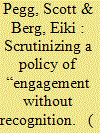

|
|
|
|
|
| Summary/Abstract |
De facto states are conventionally perceived as illegal entities, usually ignored by the rest of the world and therefore also isolated and severely sanctioned in most cases. We investigate US foreign-policy engagement with Abkhazia, Nagorno-Karabakh, Northern Cyprus, Somaliland, and Transnistria and explore when, why, and how interactions between the United States and “places that do not exist” has taken place. This is done by extensively using WikiLeaks diplomatic cables from 2003– to 2010 as a primary information source. We assume that by engaging and not recognizing, the US has sought to increase its leverage and footprint in conflicts that somehow affect its national interests. This engagement approach is presumably most successful when targeted adversaries turn out to be agents of peace and stability, or when strategic calculus outweighs the rationale for the conventional treatment of sovereign anomalies.
|
|
|
|
|
|
|
|
|
|
|
|
|
|
|
|
|
|
|
|
|